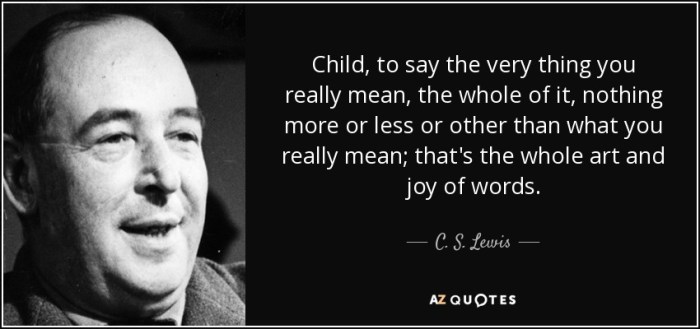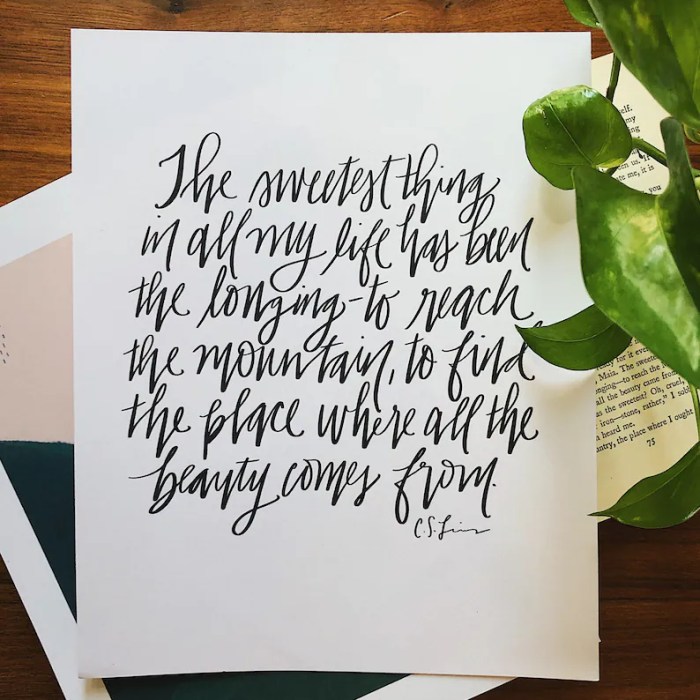Till we have faces quote – The evocative quote “Till We Have Faces” from C.S. Lewis’s classic novel invites us to explore the complexities of the human experience. This profound statement serves as a gateway to a literary journey that delves into the depths of identity, love, and the search for meaning.
Throughout the novel, characters grapple with the masks they wear and the faces they hide, revealing the intricate tapestry of human nature. Lewis’s words resonate with a timeless truth, reminding us of the transformative power of vulnerability and the enduring quest for authenticity.
Introduction

The quote “Till We Have Faces” holds profound significance in the novel of the same name by C.S. Lewis. It serves as a pivotal theme that explores the multifaceted nature of identity, self-perception, and the quest for love and acceptance.Throughout
the novel, the characters grapple with their own identities and the masks they present to the world. The quote suggests that true understanding and acceptance can only be achieved when we confront our own flaws and vulnerabilities, and embrace our true selves.
By doing so, we can shed the masks that have kept us hidden and experience the transformative power of love.
Character Analysis

The quote, “Till we have faces, we have nothing,” highlights the significance of identity and self-awareness in human existence. In C.S. Lewis’s novel Till We Have Faces, several characters embody this concept and grapple with their own struggles related to identity and self-discovery.
Orual
Orual, the protagonist, is a complex and flawed character who embodies the quote’s message. Haunted by feelings of inadequacy and a desire for recognition, she struggles to find her true identity amidst the expectations and judgments of others. Orual’s experiences mirror the quote’s emphasis on the importance of self-awareness and the need to confront one’s own flaws and weaknesses.
Bardia, Till we have faces quote
Bardia, Orual’s father, is a wise and compassionate ruler who recognizes the importance of identity and self-acceptance. Through his guidance and support, Bardia helps Orual to understand her own strengths and weaknesses, ultimately leading her on a journey of self-discovery and growth.
Istra
Istra, Orual’s younger sister, represents the antithesis of Orual’s struggles. Beautiful and confident, Istra embodies the quote’s message in a different way. She is able to find her identity and purpose in life through her unwavering faith and love for others.
Theme Analysis

The quote from Till We Have Facesdelves into profound themes that explore the human condition and the nature of divinity. These themes are interwoven throughout the novel, shaping the characters’ journeys and the overall narrative.
The Search for Identity and Meaning
One of the central themes is the struggle for identity and purpose. Orual, the narrator, grapples with her own self-worth and her place in the world. Her desire to be loved and accepted leads her to question her true self and the expectations placed upon her.
The quote “Till We Have Faces” from C.S. Lewis’ novel of the same name beautifully captures the transformative power of empathy. Its relevance extends beyond literature, as it resonates with the mathematical concept of given qr pt and qpr str . Just as empathy enables us to see the world through another’s eyes, this mathematical concept helps us understand the intricate relationships between geometric shapes and their properties, shedding light on the hidden beauty of mathematics and the profound insights it offers.
“I am not what I was, and I do not know what I am.”
The novel also explores the nature of divinity and the search for meaning in a world filled with suffering. Orual’s journey leads her to confront her own beliefs and the limitations of her understanding.
The Power of Love and Forgiveness
Another significant theme is the power of love and forgiveness. Orual’s relationship with her sister Psyche is a complex and often strained one. However, through their trials and tribulations, they learn the importance of love and the ability to forgive one another.
“Love is not a feeling, it is a commitment. It is a promise that you make to yourself and to the other person, that no matter what happens, you will be there for them.”
The novel also explores the transformative power of forgiveness. Orual’s journey towards redemption requires her to confront her own guilt and the consequences of her actions.
Symbolism and Imagery

The quote employs various symbols and images to convey its profound meaning. The “faces” in the phrase “till we have faces” symbolize the true identities or innermost selves of individuals. These faces are often hidden beneath masks or facades that society and expectations impose.
The journey to “have faces” represents the process of self-discovery and authenticity, where individuals shed these masks and reveal their genuine selves.
The Journey as a Physical and Spiritual Transformation
The quote’s imagery of a journey highlights the arduous and transformative nature of the quest for self-discovery. The journey is depicted as a physical and spiritual pilgrimage, where individuals must navigate challenges, confront their inner demons, and ultimately reach a state of self-acceptance and wholeness.
Light and Darkness
The quote also employs the symbolism of light and darkness. Light represents truth, clarity, and self-knowledge, while darkness represents ignorance, fear, and the unknown. The journey towards “having faces” involves navigating through both light and darkness, as individuals confront their shadows and ultimately emerge with a deeper understanding of themselves and the world around them.
Historical and Cultural Context

Lewis’s novel was written in the aftermath of World War II, a period marked by profound disillusionment and questioning of traditional values. The war had shattered the illusion of progress and humanism, and Lewis sought to explore the nature of good and evil in a world that seemed to have lost its moral compass.
Influence of Christianity
Lewis was a devout Christian, and his novel is deeply informed by Christian theology. The novel’s central conflict between Orual and the “shadow” represents the struggle between good and evil within the human soul. Lewis believed that all humans are born with a sinful nature and that only through the grace of God can they be redeemed.
Influence of Ancient Greek Mythology
Lewis was also a scholar of ancient Greek mythology, and his novel draws on many elements of Greek tragedy. The character of Psyche, for example, is based on the Greek myth of Psyche and Eros. Lewis uses the myth to explore the themes of love, sacrifice, and redemption.
Literary Devices
The quote employs several literary devices to convey its message effectively. These devices contribute to the quote’s emotional impact, enhance its meaning, and make it more memorable.
One prominent literary device is metaphor. The quote compares the process of “having faces” to a “slow dance.” This metaphor suggests that the process of becoming fully human is gradual and involves a series of interactions and experiences that shape our identity.
Another literary device used is personification. The quote attributes human qualities to the concept of “faces,” suggesting that our faces are not merely physical features but also reflect our inner selves. This personification emphasizes the importance of our faces as expressions of our humanity.
The quote also employs alliteration, the repetition of consonant sounds, as in “slow dance.” This alliteration creates a sense of rhythm and flow, making the quote more pleasing to the ear and easier to remember.
Finally, the quote utilizes imageryto evoke a vivid picture in the reader’s mind. The image of a “slow dance” suggests a graceful and deliberate movement, which reinforces the idea that the process of becoming fully human takes time and effort.
These literary devices work together to create a quote that is both evocative and thought-provoking. They enhance the quote’s emotional impact, clarify its meaning, and make it more memorable.
Personal Interpretation: Till We Have Faces Quote
The quote, “Till we have faces, we have nothing to hide,” resonates deeply with me. It speaks to the idea that true authenticity and vulnerability come from shedding our masks and embracing our true selves, even when it makes us feel exposed and uncomfortable.
Unmasking Our True Selves
In our daily lives, we often hide behind facades to protect ourselves from judgment and rejection. We may present a carefully curated image of ourselves, suppressing our flaws and insecurities. However, this constant self-censorship can lead to a sense of emptiness and inauthenticity.
By removing our masks, we open ourselves up to the possibility of genuine connection and intimacy. When we share our vulnerabilities and imperfections, we invite others to see us for who we truly are. This can be a daunting task, but it is ultimately liberating.
The Power of Vulnerability
Vulnerability is not a sign of weakness but rather a strength. It requires courage to be honest with ourselves and others about our struggles and fears. However, when we embrace vulnerability, we create a space for healing and growth.
By sharing our experiences, we can connect with others who have gone through similar challenges. This can help us feel less alone and more understood. It can also inspire us to be more compassionate and empathetic towards ourselves and others.
Authenticity and Self-Acceptance
Ultimately, the journey towards removing our masks leads us to a deeper sense of authenticity and self-acceptance. When we no longer feel the need to hide or pretend, we can live our lives more fully and authentically.
This does not mean that we should become careless or reckless in our interactions with others. Rather, it means that we should strive to be true to ourselves while also being mindful of the impact our words and actions have on others.
Comparative Analysis
The quote “Till we have faces” echoes sentiments expressed in other literary works, inviting comparisons that illuminate its significance.
Contrast with “To Kill a Mockingbird”
Harper Lee’s To Kill a Mockingbirdexplores similar themes of innocence and prejudice. Like Maia in “Till we have Faces,” Scout Finch confronts societal injustice and the flawed nature of humanity. Both works highlight the transformative power of empathy and the importance of seeing beyond superficial appearances.
Connection with “The Catcher in the Rye”
J.D. Salinger’s The Catcher in the Ryeshares a thematic resonance with “Till we have Faces.” Holden Caulfield’s alienation and search for authenticity parallel Maia’s struggle with her own identity and the societal expectations imposed upon her. Both works explore the complexities of adolescence and the challenges of navigating a world that often feels incomprehensible.
Influence of Classical Mythology
Lewis’s novel draws heavily upon classical mythology, particularly the story of Psyche and Eros. Maia’s journey to find her true self and her ultimate transformation into a goddess mirror Psyche’s own trials and eventual apotheosis. This mythological parallel enriches the quote’s significance, suggesting that even in the face of adversity, there is potential for growth and redemption.
Expert Answers
What is the significance of the “Till We Have Faces” quote?
The quote encapsulates the idea that true understanding and connection can only be achieved when we shed our masks and reveal our authentic selves.
How does the quote relate to the themes of the novel?
The quote is central to the novel’s exploration of identity, love, and the search for meaning. It challenges the notion of superficiality and encourages readers to embrace vulnerability and authenticity.